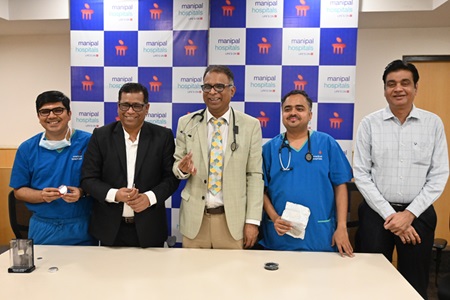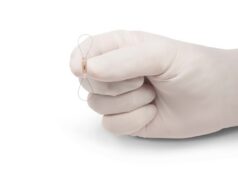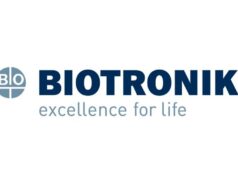
Manipal Hospitals—one of the largest healthcare networks in India—has announced the successful insertion of an artificial intelligence (AI)-driven wireless injectable pacemaker.
The Aveir leadless pacemaker (Abbott), recently introduced in India, was implanted in a 65-year-old woman at Manipal Hospital (Kolkata, India), making it the first centre in eastern India to perform this procedure. The device, which is already in use in the USA and Europe, offers a safer, less invasive alternative to traditional pacemakers. The second and third procedures in the region were also conducted at units of Manipal Hospitals in Kolkata.
The event was attended by several cardiologists from Manipal Hospitals, including P K Hazra, Sumanta Chatterjee, Soumya Kanti Dutta, Dilip Kumar and Rajesh Pareekh.
Weighing just 2.4g, the Aveir leadless pacemaker uses nanotechnology to remain securely in the heart and lasts 20–25 years—three times longer than traditional pacemakers—as noted in a Manipal Hospitals press release. Its non-magnetic design ensures compatibility with airport scanners, magnetic resonance imaging (MRI), and high-voltage currents, preserving daily functionality of the patient, the release also details.
“The non-rechargeable Aveir leadless pacemaker offers a key advantage: it can be upgraded from a single- to a dual-chamber configuration, efficiently managing the right atrium and ventricle,” said Hazra. “This pacemaker eliminates the need for invasive surgery and external wires, and features Bluetooth-enabled technology for remote monitoring and adjustments. Specialists worldwide can now monitor the patient.”
“While wireless pacemakers are not new, the previous models couldn’t pace both chambers—the atrium and the ventricles,” Kumar added. “The pacemaker reduces the risks of haematoma formation, infections, lead dislodgement, and other lead-related issues.”
“This pacemaker is injected directly into the heart’s right ventricle, eliminating the need for external wires and surgical pockets, which are the primary causes of infections in patients,” Dutta commented. “This device is perfect for those with compromised immunity, skin issues, [and] patients on dialysis or blood thinners. The device’s minimally invasive nature also makes it ideal for those concerned about scarring.”
India is now the third global region to adopt this US Food and Drug Administration (FDA)- and European-approved injectable pacemaker, potentially offering a permanent solution to enhance patients’ quality of life.









